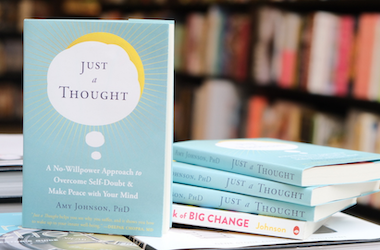
Today’s article was written by Change Coach Lindsey Elliott
We all feel overwhelmed from time to time. It’s a normal human experience. But if we feel overwhelmed much of the time this can become debilitating for our mental and physical health. Life in our society seems rather conducive to being overloaded with all we ‘have’ to do, achieve and are responsible for. Particularly in the last couple of years with the Covid pandemic, and now the cost of living crisis, many more people are experiencing feelings of overwhelm with so many changes and uncertainty around.
It can sometimes be hard to discern if we simply have too much to do, too much on our plate for one human being to achieve, OR whether we are experiencing a busy mind about all we have to do, which is creating feelings of overwhelm.
Let’s start with a couple of distinctions.
Overwhelm
The key here is that overwhelm is a feeling, a state of mind. It tends to comes with other sensations such as racing mind, maybe shallow breathing, not being able to think straight, little things getting to you. It’s a state of having too much on your mind. We may feel overwhelmed by our long to do list, or we can also feel overwhelmed by one particular issue. Put simply, overwhelm is caused by over-thinking.
We have early warning signals that we are becoming overwhelmed – for me I get very serious, single minded, stop communicating, I start shoving things in cupboards rather than putting them away properly, and begin to feel resentful. What are your early warning signs that you are tipping into overwhelm?
What can be so useful to see is the distinction that overwhelm is not who we are (“I’m so overwhelmed!”), but rather it is a feeling passing through.
Overloaded
This is having too much to do in the time we have to do it, and/or having more to do than our bodies/minds are able to support. This varies from person to person according to our personal capacity (which also fluctuates). Being overloaded is a state that may take time to show up. We may carry on trying to get everything done before we start to feel the physical and emotional effects within our body and mind. This overloading of our system means the system will likely break down e.g. physically or emotionally. We typically see this when people get ill on holiday as soon as they slow down, or always catch whatever bug is going around.
So how do we know if we are overloaded or overwhelmed? The tricky thing is that we need to be out of the feeling of overwhelm before we can accurately assess whether we are actually overloaded, and need to take some things off our plates. When we are in overwhelm even a small number of things to get done can feel like overload.
When I am in a quieter head space I find it useful to ask myself –
Am I busying myself with what I have to do, and this is why I feel overwhelmed or do I actually have too much to do?
I experience a bit of both with this. Sometimes I am just habitually caught up in thinking about everything I need to get done today (usually with made-up-by-me deadlines I am trying to achieve!), and sometimes what I want to get done simply can’t be done all in one day, or one week.
Something I have noticed that has been hugely helpful is when I am innocently keeping my head full of thinking and analysing which makes me feel more busy than I actually am – this is creating the feeling of overwhelm, not what I actually have to do. I find myself thinking about the next three things I have to get done whilst carrying out the task in front of me. This isn’t a state of having too much to do. It’s a state of overthinking.
Maybe reflect on – How much time are you innocently spending thinking about all you have to do and is this creating the feelings of rushing and overwhelm??

A useful metaphor
A useful metaphor for how the mind works is that of a deep pool. On the surface of the water it gets all choppy according to whatever weather is passing through. But the water underneath is always still. The mind is the same – it gets ‘choppy’ depending on the volume/type of weather (thoughts) passing through but underneath there is always a still, calm place within us. We can’t make decisions about how much we have to do and to evaluate if we are overloaded, when the water is choppy. Once the water settles we are able to take a much more objective view about whether we actually have too much to do, or are we just caught up in overwhelmed thought/feeling. A good thing to know is what settles the choppy water… doing nothing! Stopping stirring the water up with more and more thinking and organising, and the water will settle all by itself.
What to do if we are overwhelmed or overloaded
Overwhelm
If we are feeling overwhelmed there isn’t much we have to do as the human psychological/emotional system resets all by itself– we don’t have to do anything but knowing that this is how we work can make all the difference. What this means is our mind will quieten down eventually, all by itself and the feelings will pass. As the inherent nature of our minds is quiet and clarity there is nothing we can do to calm our minds faster than doing nothing …even if it doesn’t ‘feel’ this way to us! It’s a bit like a magnet pulling metal closer to it; our minds are designed to ‘pull’ us back to our natural state of clarity. The system is also designed to deliver us new, fresh thought which can change our perspective on what we need to get done. Once I am not caught up in my busy mind I often find that some things I thought needed to be done, simply don’t need to be.
Another helpful place to look when feeling overwhelmed is: What beliefs am I innocently holding onto that are contributing to my experience of overwhelm? E.g. what do I believe I have to achieve in order to be a ‘good parent’ or ‘colleague’? To be good enough? To be successful? Looking outside of ourselves for external validation and feelings of good enough-ness means we may believe we have to achieve a certain amount, or prove our usefulness, in order to be loved and approved of.
If you regularly experience overwhelm, now is the time to be extra kind and compassionate with yourself. When we are in it, we are in it. We don’t need to add an extra layer of guilt or shame into the mix. All humans feel overwhelmed at some point. A great reminder is that we can’t always see how it’s working when we are in the ‘thick’ of the emotion but we will ALWAYS come back out the other side…of any emotion. It will definitely look like the many tasks you need to complete, or that tricky problem, is what is causing your feelings of overwhelm, but the reality is that your thinking about those things is where your feelings are coming from. 100% of the time. We lose sight of this very easily.
What if the feelings of overwhelm are alerting us to the state of our mind, not the state of our life?
Lastly, it is an illusion that we will ever get through our to-do-list so punishing ourselves with thoughts of the relief we’ll feel when we have it all done, doesn’t make sense and definitely doesn’t help us.
Overload
If from a quieter space we have seen that our load is too much, there are various things we can do, but the most helpful thing I have seen is this:
As a person who loves a to-do-list (mostly for the dopamine hit of crossing off!) and loves to be organised (which can be a double-edged sword) I am slowly seeing that there is an energy behind life that is living us all. I may have a Lindsey-agenda for how the day may go, and what I think needs to be done but I often find that what I am moved to do, and not do, varies from my own agenda.
What if we can rely on this energy of life to move us to what actually needs to be done?
What if it is possible to follow our inspiration in the moment about what to do, rather than a never-ending list of tasks? Or put a different way, there is a vast intelligence behind life that we can trust and what I find myself doing is what is supposed to be happening. This intelligence behind life is supporting me, rather than little me having to figure it all out. What we do from this space comes from an inspired feeling, a deeper feeling which we can come to recognise and trust.
You can learn more about Lindsey here: https://www.lindseyelliott.co.uk/






















